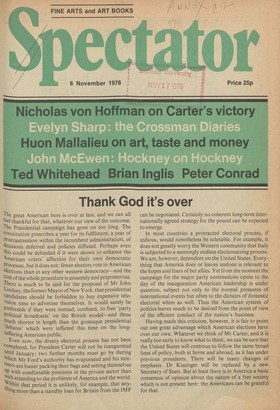Thank God it's over
The great American bore is over at last, and we can all feel thankful for that, whatever our view of the outcome. The Presidential campaign has gone on too long. The constitution prescribes a year for its fulfilment, a year of Procrastination within the incumbent administration, of decisions deferred and policies diffused. Perhaps even this could be defended if it were shown to enhance the American voters' affection for their own democratic Processes, but it does not: fewer electors vote in American elections than in any other western democracy—and the cost of the whole procedure is unseemly and preposterous. There is much to be said for the proposal of Mr John Lindsay, the former Mayor of New York, that presidential candidates should be forbidden to buy expensive television time to advertise themselves. It would surely be Preferable if they were instead, confined, to free 'party Political broadcasts' on the British model—and these ,rtluch shorter in length than the grotesque presidential debates' which were inflicted this time on the longsuffering American public. Even now, the dreary electoral process has not been completed, for President Carter will not be inaugurated until January; two further months must go by during ‘v, Inch Mr Ford's authority has evaporated and his ministers are busier packing their bags and setting themselves 41? With comfortable positions in the private sector than A',..!th attending to the problems of America and the world. !thin that period it is unlikely, for example, that anylung more than a standby loan for Britain from the IMF
can be negotiated. Certainly no coherent long-term internationally agreed strategy for the pound can be expected to emerge.
In most countries a protracted electoral process, if tedious, would nonetheless be tolerable. For example, it does not greatly worry the Western community that Italy is subjected to a seemingly endless electioneering process. We are, however, dependent on the United States. Everything that America does or leaves undone is relevant to the hopes and fears of her allies. Yet from the moment the campaign for the major party nominations opens to the day of the inauguration American leadership is under question, subject not only to the normal pressures of international events but often to the dictates of domestic electoral whim as well. Thus the American system of politics leaves much to be desired from the point of view of the efficient conduct of the nation's business.
Having made this criticism, however, it is fair to point out one great advantage which American elections have over our own. Whatever we think of Mr Carter, and it is really too early to know what to think, we can be sure that the United States will continue to follow the same broad lines of policy, both at home and abroad, as it has under previous presidents. There will be many changes of emphasis. Dr Kissinger will be replaced by a new Secretary of State. But at least there is in America a basic consensus of opinion about the nature of a free society which is not present here: the Americans can be grateful for that.


















































